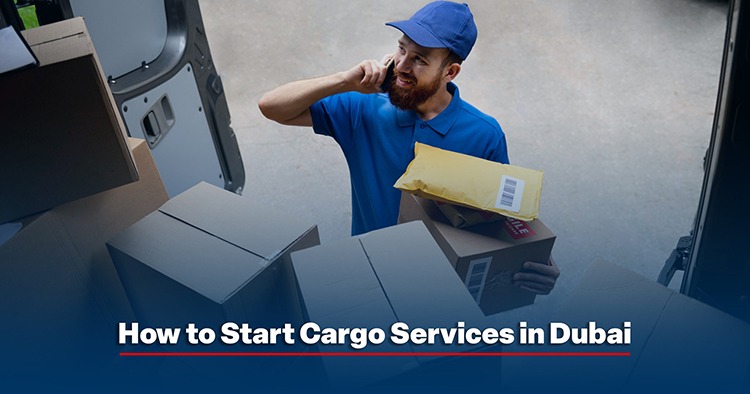Cargo services are soaring in the UAE—worth USD 54.5 billion in 2024 and set to hit USD 95.2 billion by 2033 (IMARC Group). Why are Dubai’s cargo laws, VAT rules, and licensing so vital? This guide answers clearly and simply, helping your cargo business succeed with trust and speed.
Table of Contents
Toggle- What Is the Cargo Business?
- Why Start a Cargo Business in Dubai? Your Complete Guide to Success
- What Type of Business Is Cargo?
- What Are the Legal Requirements to Start a Cargo Business in the UAE?
- What Licenses Do Cargo Services Need in the UAE?
- How do I start a cargo company?
- How Is VAT Applied to Cargo Services in the UAE?
- Summary
- FAQ’s
What Is the Cargo Business?
The cargo business is the backbone of trade, moving goods from one place to another. It includes shipping by land, air, or sea. Cargo services support trade, both local and international. Also, they handle storage, packaging, and customs paperwork, ensuring products reach markets safely and on time.
Because of e-commerce, demand keeps rising every year. Many companies use cargo firms to cut delivery time. In the UAE, ports and free zones make this sector vital for business growth.
Therefore, strong logistics matter more than ever. It means faster deliveries, wider reach, and smoother connections between buyers and sellers worldwide. Cargo services help your business stay ahead.
How It Works
Cargo companies handle more than just transportation. They manage:
- Shipping: Moving goods via planes, ships, trucks, or trains.
- Storage: Warehousing products securely until they’re ready for distribution.
- Customs Clearance: Navigating regulations and paperwork for international shipments.
- Packaging & Handling: Ensuring items are packed safely to prevent damage during transit.
This end-to-end process is what we call Cargo Services, a complete solution for businesses looking to move goods seamlessly.
How Cargo Services Help Businesses?
- Faster Delivery: Local warehouses and efficient logistics cut transit times.
- Cost Savings: Bulk shipping and optimized routes reduce expenses.
- Risk Management: Secure handling and compliance with regulations prevent losses or delays.
Future Trends
- Technology: AI and automation are improving tracking, warehousing, and delivery accuracy.
- Sustainability: Companies are adopting eco-friendly practices, like electric vehicles and optimized routes, to reduce environmental impact.
- E-Commerce Growth: Demand for cargo services will keep rising as online shopping expands.
The cargo business is more than just transportation—it’s a critical partner in global commerce. Whether you’re a small business shipping products locally or a large corporation trading internationally, reliable cargo services ensure your goods move safely, quickly, and cost-effectively.
For companies in the UAE and beyond, understanding this industry is key to staying competitive and meeting the demands of today’s connected world.
Looking for cargo solutions? Partner with experts who understand your needs and can deliver results.
Why Start a Cargo Business in Dubai? Your Complete Guide to Success
Dubai stands as a global logistics leader, offering unmatched advantages for cargo businesses. With its strategic location, world-class infrastructure, and business-friendly policies, the city has become a top choice for entrepreneurs worldwide. Whether you’re moving goods by air, sea, or land, Dubai provides the ideal environment for growth and profitability.
1. Prime Global Location
Dubai connects Asia, Europe, and Africa seamlessly. Consequently, it serves as a central hub for international trade. For instance, Jebel Ali Port handled over 19.4 million tons of cargo in 2023, making it one of the world’s busiest ports. Additionally, airports like Dubai International (DXB) and Al Maktoum offer access to 200+ destinations within 8 hours. This connectivity ensures faster shipping and expanded market reach.
2. Tax-Free Benefits & Ownership
Free zones like JAFZA and Dubai Logistics City offer 0% corporate and personal tax. Moreover, they allow 100% foreign ownership and full profit repatriation. These advantages significantly boost profitability while reducing operational costs.
3. World-Class Infrastructure
Dubai invests heavily in logistics infrastructure. For example, Dubai Logistics City provides smart warehouses and automated systems. Similarly, the Etihad Rail project enhances multimodal connectivity across the UAE. Such facilities ensure smooth operations and scalability.
4. Booming E-Commerce Demand
The UAE’s e-commerce market reached $3.9 billion in 2023 and is projected to hit $8 billion by 2025. This growth fuels demand for last-mile delivery and warehousing Cargo Services. As a result, cargo businesses enjoy a steady stream of opportunities.
5. Streamlined Business Setup
Setting up a Cargo Services business in Dubai is quick and efficient. Free zones like JAFZA issue licenses in 1-2 weeks. Additionally, digitalized processes minimize paperwork and delays.
6. Government Support & Innovation
Dubai’s government actively backs the logistics sector. Initiatives like the Dubai Logistics Master Plan 2040 aim to reduce carbon emissions by 30% while promoting technology adoption. Such support ensures long-term sustainability and growth.
Dubai Cargo Business: Key Advantages Driving Global Trade Growth
| Feature | Benefit | Impact |
| Strategic Location | Connects Asia, Europe, and Africa | Faster delivery, wide global access |
| Tax-Free Zones | 0% corporate and personal tax | More profit, better cash flow |
| E-Commerce Growth | UAE market to hit $8B by 2025 | High demand for delivery and logistics |
| Smart Infrastructure | Jebel Ali Port: 15.5M TEUs in 2024 + automation | Boosts speed, cuts costs |
7. Access to Skilled Talent
Dubai attracts logistics experts from around the world. Furthermore, training programs and universities ensure a steady supply of skilled professionals. This availability helps businesses build reliable and knowledgeable teams.
8. Free Zone Perks
Zones like JAFZA and Dubai Logistics City offer ready-made offices, warehouses, and customs support. Moreover, they provide networking opportunities with industry leaders. These perks simplify operations and foster growth.
9. Technological Advancements
Dubai embraces AI, IoT, and blockchain in logistics. These technologies optimize routes, track shipments, and reduce costs. Thus, businesses operate more efficiently and transparently.
10. Robust Trade Networks
Dubai has signed 140+ double taxation treaties. Similarly, it offers access to GCC and African markets. Therefore, businesses can expand globally with ease.
In short, Dubai’s cargo sector offers unmatched advantages for entrepreneurs. From tax benefits to cutting-edge infrastructure, the city provides a ideal launchpad for global logistics ventures.
So, tap into this dynamic market and accelerate your growth today!
Ready to start your cargo business? Leverage Dubai’s opportunities with expert guidance and seamless trade business setup services.
What Type of Business Is Cargo?
Cargo is a service-based business that focuses on moving goods safely and quickly across borders. It covers air, sea, and land transport while offering related support like warehousing and customs clearance. Because global trade keeps growing, Cargo Services remain vital for companies that want faster delivery and lower costs. Here are the main business types that fall under cargo.
Main Types of Cargo Business
- Air Cargo Services: Moves goods by plane. Therefore, it is best for fast delivery of small or urgent shipments.
- Sea Freight: Ships bulk goods worldwide. Hence, it offers low cost but longer transit time.
- Land Transport: Uses trucks or rail. Thus, it is useful for regional and cross-border delivery.
- Courier & Express: Handles parcels and e-commerce orders. As a result, demand grows with online shopping.
- Warehousing & Storage: Provides space for goods before transport. Moreover, it ensures safe handling and timely dispatch.
- Customs Brokerage: Manages paperwork and clearance. Consequently, it saves clients time and avoids costly delays.
- Integrated Cargo Services business: Combines shipping, storage, and customs. Therefore, it offers end-to-end solutions under one provider.
Cargo Business Types and Key Features
| Type of Cargo Business | Key Features | Why It Matters |
| Air Cargo Services | Fast, global reach | Ideal for urgent and high-value goods |
| Sea Freight | Large volume, low cost | Best for heavy and bulk shipments |
| Land Transport | Trucking and rail options | Useful for regional and GCC delivery |
| Courier & Express | Quick parcel handling | Driven by e-commerce demand |
| Warehousing & Storage | Safe and organized facilities | Supports trade flow and timely supply |
| Customs Brokerage | Clearance and document handling | Reduces risks and speeds up shipment |
| Cargo Services Business | Full package: shipping, storage, customs | Saves clients’ cost and improves trust |
Cargo is not just about transport; it is a complete service model. By offering flexible solutions across different channels, Cargo Services helps businesses expand faster and reach new markets with ease.
What Are the Legal Requirements to Start a Cargo Business in the UAE?
Starting a cargo business in the UAE is a fantastic opportunity. However, navigating the legal setup can feel overwhelming. Therefore, this clear guide breaks down the essential requirements into simple steps. Let’s get started.
- First, you need a Trade License. This is your official permission to operate. The Department of Economic Development (DED) issues this for mainland companies. Alternatively, a free zone authority provides it if you set up there. Your specific activity, like freight forwarding, must be listed correctly.
- Furthermore, specialized approvals are often mandatory. For instance, handling air cargo requires clearance from the General Civil Aviation Authority (GCAA). Similarly, dealing with sea freight means getting approval from the relevant Port Authority.
- Moreover, a Customs Broker License is absolutely vital. This permit allows you to clear goods through UAE ports for your clients. Consequently, it is essential for any import or export operation.
- Additionally, don’t forget about transport permits. If you plan to use trucks, the Roads and Transport Authority (RTA) requires a specific license. This is especially important for oversize or heavy-load shipments.
- Also, consider warehousing permits. Operating a storage facility needs approval from local municipalities and civil defense. This step ensures your warehouse meets all necessary safety and security standards.
Finally, here’s a key piece of advice. Partnering with a local business consultant like BusinesslinkUAE is highly recommended. They understand the system’s nuances and can prevent costly errors. This smart move ensures your new venture starts smoothly and successfully.
What Licenses Do Cargo Services Need in the UAE?
Starting a Cargo Services business in the UAE requires the right licenses and approvals. Without them, your company cannot operate legally. The type of license depends on your services, such as freight forwarding, warehousing, or customs clearance. Below is a clear guide to the main licenses every cargo business must know.
Core Licenses for Cargo Services in the UAE
| License Type | Issuing Authority | Purpose / Covered Activities |
| Trade License | DED or Free Zone Authority | Required for all cargo and logistics companies |
| Freight Forwarding License | DED / Free Zone | For arranging transport by air, sea, or land |
| Transport License | Roads and Transport Authority (RTA) | Needed if you own and operate trucks or vans |
| Customs Broker License | Federal Customs Authority / Dubai Customs | Allows clearance of imports and exports |
| Air Cargo Handling Approval | General Civil Aviation Authority (GCAA) | Required when dealing with air freight operations |
| Marine Transport / Port Approval | Dubai Maritime Authority / Port Authority | For sea cargo and shipping services |
| Warehouse License | DED / Free Zone / Civil Defense | For operating bonded, refrigerated, or general storage facilities |
Why These Licenses Matter
- Trade License: The foundation of every cargo company. Mainland or Free Zone setup will decide your ownership rights and market reach.
- Freight Forwarding License: Essential if you manage shipments without owning vehicles. Covers local and international logistics.
- Transport License: Mandatory for road cargo operations. Special permits apply for heavy or oversized loads.
- Customs Broker License: Saves clients time by handling clearance paperwork and customs codes.
- Air and Sea Approvals: Ensure compliance with aviation and maritime rules for safe operations.
- Warehouse Permit: Needed if you store, re-pack, or distribute goods before delivery.
Key Points for Investors
- Choose Mainland if you want to trade directly across the UAE.
- Choose a Free Zone if you want tax benefits and full ownership.
- Always match the license with your listed activities to avoid fines.
- Plan renewals early to keep your approvals active.
The UAE cargo sector is highly regulated, but clear licensing ensures smooth business operations and client trust. Whether you focus on freight forwarding, customs clearance, or warehousing, the right approvals are the backbone of your success.
How do I start a cargo company?
Want to start cargo services in the UAE? You can. The market is strong, and demand keeps rising. However, success needs clear steps, correct licenses, and tight costs.
Quick plan
- Research demand in your niche. Compare rates and routes.
- Pick your model: freight forwarding, road haulage, air, sea, or warehousing.
- Choose jurisdiction: mainland for UAE-wide trade, or a free zone.
- Reserve a trade name with DET or your free zone.
- List activities: freight, customs brokerage, warehousing, and last-mile.
- Apply for the license with DET or the zone authority.
- Secure premises: office and, if needed, a warehouse lease.
- Register with customs to clear imports and exports.
- Open a bank account after licensing.
- Arrange insurance: cargo, liability, vehicle, and workers’ comp.
- Hire staff: drivers, warehouse team, and a customs coordinator.
- Set up tech: tracking, e-AWB, invoicing, and CRM.
- Begin with clear SLAs and published transit times.
Documents you’ll need
- Passport and UAE IDs for owners and manager
- Trade name reservation and initial approval
- Lease (Ejari or free zone lease)
- Memorandum of Association or zone formation docs
- External approvals, where required (Customs, GCAA, Port)
Cargo Business Setup Costs in UAE: Full Mainland vs Free Zone
| Item | Mainland (AED) | Free zone (AED) | Notes |
| Trade license | 10,000–15,000 | 8,000–14,000 | Varies by activity list |
| Customs registration | 1,000–2,000 | 1,000–2,000 | Plus deposits in some cases |
| Office/warehouse rent (year) | 30,000–60,000 | 15,000–40,000 | Zone flexi-desk lowers cost |
| Trucks/vans (each) | 70,000–200,000 | 70,000–200,000 | Lease or buy |
| Insurance bundle (annual) | 10,000–25,000 | 10,000–25,000 | Cargo + liability |
| Staff visas & IDs (per person) | 3,000–6,000 | 3,000–6,000 | Medical + Emirates ID |
| Systems (TMS/WMS + website) | 15,000–40,000 | 15,000–40,000 | Include tracking portal |
Mainland vs free zone
-
Mainland
-
-
- Trade anywhere in the UAE.
- Wider bidding access.
- Slightly higher setup in many cases.
-
-
Free zone
-
- 100% foreign ownership.
- Bundled packages available.
- Local trading may need a distributor.
Compliance checklist
- Renew license and leases on time.
- Keep driver permits and vehicle tests current.
- Maintain calibrated scales and safety logs.
- Store MSDS for hazardous cargo, if any.
- Use approved customs codes and invoices.
Service menu to win clients
- Domestic and GCC road freight
- Air freight with e-AWB and priority handling
- Sea freight FCL/LCL with port handling
- Customs clearance and duty advisory
- Warehousing, pick-pack, and last-mile
- Returns and reverse logistics for e-commerce
Practical tips
- Start lean; add routes after consistent loads.
- Publish transit times; update clients proactively.
- Negotiate fuel clauses to protect margins.
- Track KPIs weekly: on-time %, damage rate, empty miles.
- Build ties with airlines, shipping lines, and yards.
Ready to move? Set your niche, lock the license, and start hauling.
How Is VAT Applied to Cargo Services in the UAE?
Value Added Tax (VAT) directly affects how cargo companies operate in the UAE. The Federal Tax Authority (FTA) sets clear rules, and every logistics firm must follow them to stay compliant. Below is a simple guide on how VAT applies to cargo services.
VAT Rules for Cargo Services
1. Domestic Cargo Services – 5% VAT
- Moving goods inside the UAE by road, air, or sea is taxed at the standard 5%.
- This also applies to local warehousing, storage, and customs brokerage linked only to domestic shipments.
2. Export Services – 0% VAT
- Cargo moving from the UAE to outside the GCC is zero-rated.
- No VAT is charged, but businesses must keep proof such as customs papers or bills of lading.
3. Import Services – Reverse Charge Mechanism
- When importing, VAT is not paid at customs.
- Instead, it is declared in the VAT return under the reverse charge system.
4. Transit and Transshipment – 0% VAT
- Goods passing through the UAE en route to another country usually qualify for zero-rating.
- Documentation must confirm that the cargo left the UAE.
5. Free Zones – Special Rules
- Some designated free zones provide VAT relief.
- Transactions within those zones may be zero-rated, but cargo moving to or from the mainland is taxed at 5%.
6. Related Services
- Customs clearance fees: subject to 5%.
- Warehousing and storage: normally 5%, unless the facility is bonded, in which case VAT may be deferred.
- Freight forwarding charges: follow the VAT treatment of the underlying transport.
Quick VAT Reference Table
| Cargo Activity | VAT Rate | Key Condition |
| Domestic transport (air, sea, land) | 5% | Within the UAE borders |
| Export shipments | 0% | Valid customs/export proof required |
| Import shipments | Reverse Charge | Declared in the VAT return |
| Transit cargo | 0% | Must exit the UAE with supporting documents |
| Warehousing & storage | 5% | Bonded warehouses may defer VAT |
| Customs brokerage | 5% | Applies to clearance services |
| Free zone cargo | 0% / 5% | Depends on zone classification |
VAT Registration for Cargo Businesses
- Any company with taxable supplies above AED 375,000 per year must register for VAT.
- VAT registration ensures you can charge clients correctly and reclaim input VAT on eligible expenses.
- You must issue proper tax invoices showing:
- VAT amount
- TRN (Tax Registration Number)
- Clear description of services
Why Compliance Matters
- Correct VAT application avoids penalties from the FTA.
- Proper invoicing builds trust with clients and speeds up customs clearance.
- Detailed record-keeping is essential, especially for mixed services that include both local and international legs.
Applying VAT rules correctly is vital for every Cargo Services business in the UAE. Domestic moves attract 5%, exports and transits are usually zero-rated, and imports follow the reverse charge system. Free zones may bring exceptions, but documentation is always key.
If you’re starting or running a cargo business, consult a VAT expert or logistics advisor to ensure compliance and smooth operations.
Summary
Ready to enter the UAE market? Cargo services aren’t just growing—they’re shaping trade across the region. Now is the time to act. Start with the right license, follow VAT steps, and let Business Link guide you. They’ll help with company registration and support you at each step. Don’t wait for the right moment—create it. Call Business LinkUAE today and make your cargo services plan real.
Call our team today via phone at +97143215227, WhatsApp at +971502052735, or email at connect@businesslinkuae.com and get clear answers, expert advice, and hands-on help so you can attend your appointment fully prepared and confident.
FAQ’s
What is the cargo services business?
The cargo services business means moving goods safely from one point to another. It includes air, land, and sea transport, plus customs clearance, warehousing, packaging, and last-mile delivery. Because global trade and e-commerce keep expanding, demand for cargo services grows every year. In the UAE, this sector is vital for business growth. Companies must secure the right trade license and approvals before offering services, ensuring goods reach markets quickly and without delays.
How to start a cargo business in the UAE?
First, choose your activity, such as freight forwarding, warehousing, or transport. Then apply for a trade license through the Department of Economic Development (DED) or a free zone authority. After that, register with customs to handle imports and exports. If you plan to move goods yourself, secure a transport license. With skilled staff, vehicles, and proper insurance, your cargo company can grow quickly in this vital sector.
How long does it take to start Cargo Services in Dubai?
The setup time depends on your zone:
- Free zone setups: ~2–3 weeks
- Mainland setups: ~3–6 weeks
Preparation and approvals affect speed..
How can I expand Cargo Services in the UAE?
To grow:
- Add services like customs handling or storage
- Use e-commerce delivery options
- Join free zones like JAFZA for export access
- Leverage partnerships with ports, shipping firms, and customs brokers
This helps gain clients and cut costs.
What are the common challenges for Cargo Services in the UAE?
Challenges include:
- High setup and warehouse costs
- Complex customs and transport rules
- Competition from well-established firms
- Maintaining compliance with changing regulations
To manage these, you need good logistics planning and local help.
What are Cargo Services’ business benefits?
They offer fast delivery, a wide network, and customs help. Plus, they handle large volumes with ease.





